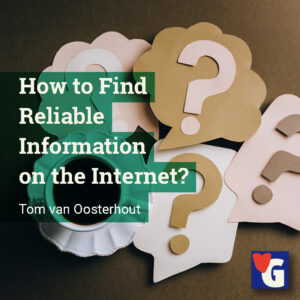
Reliable information on the Internet is at the moment a much-debated topic. Not the least on the Internet itself. This is quite rightly so.
There are all sorts of individuals, organizations, companies and governments on the Internet that only serve their own extremely limited concerns.
How to deal with such devious sources?
However, more importantly, where can you find reliable information on the Internet?
Some of the links might be affiliate links. As an affiliate associate, we earn a small commission when you purchase any of the products offered through the shared links at no extra cost for you. This helps us to maintain this website.
Table of contents
Rules of thumb

A couple of months ago I suggested some rules of thumb to judge the reliability of the information on the Internet. From my explanation above you might have guessed why these rules are important.
There are days that I have totally emerged in my books. On other days I am for hours surfing the Internet. In both cases, often hunting for just a little bit of information. This is time-consuming and complex because most information has to be reconstructed from various, sometimes very remote, sources. Moreover, such information may be outdated.
However, such historic information might still be very important, because it enables you to compare information, and sources, over the years. More in general, and this is my first tip, compare historic and actual information. This is most instructive.
Related: What to Do during Retirement? Be a Lifelong Student!
Patience and practice
Most people believe scientific information not to be very accessible. In part, they have a point. Some training to unlock scientific information comes in handy. However, with patience and practice, in time you will be able to quickly pick up what you need.
Of course, the enormous amount of information might easily overwhelm you.
For instance, the publisher Elsevier posted more than 37,000 freely accessible scientific articles on the Internet about COVID-19 (and related subjects, such as SARS and MERS). Another example is the free open-source scientific magazine Digital Health of the publisher SAGE.
To make it somewhat easier for you, just one simple tip: most scientific articles are structured in exactly the same way, and they always come with a summary. Look for conclusions in the summary, and most of the time you know in an instant whether the information is reliable.
Compare information from different sources
Don’t worry, if you shy away from scientific information. There are enough reliable other sources. Once I wanted to know how countries in Africa progressed on issues such as education, financial support for unemployment, and care provisions.
As it appeared the World Health Organization (WHO) provides very revealing and easy to read reports with statistics on the developments in countries all over the world. This is how I learned that many African countries have made tremendous progress during the past 50 years.
This information helped me greatly in changing my prejudices about Africa. Moreover, since other sources confirmed this information. So this is another simple tip: if you want to be more sure always compare information from different sources.
Unexpected sources

Another way to search for the information you need is to look in unexpected places. When you want to know everything about the COVID-19 virus, or health more in general, you might also take a look at the website of the OECD (Organisation for Economic Co-operation and Development).
The word economic might get you off balance, but don’t let yourself be fooled. The OECD has a very easy to access website and they make an effort to explain difficult issues in a common language.
On the website of the European Union (EU), you can also find an unlimited amount of information. Often in many different languages. A good tip on how to deal with this type of source is to start with information from more accessible ones and move on from there to more difficult ones.
Deep state
There is some truth in the idea that there exists such a thing as the ‘deep state’. For some people, this is the idea that there are politicians and policymakers who do not share the concerns of the citizens. They are suspected of solely supporting selfish aims of power.
However, this is a misinterpretation of what a ‘deep state’ is. Governments consist of many institutions that have already existed for some substantial amount of time. Most politicians and citizens have no clue of their existence.
Yet, these institutions share an enormous amount of reliable information. For some people, this reliable information does not represent their so-called ‘undisputed’ opinions. Hence their misinterpretation of the ‘deep state’, which only serves their own selfish aims of power.
Take for instance the National Institute on Aging (NIA) of the USA government. This is an easy to access source, which provides all kinds of useful and very reliable information. And again, in doubt check their information with other sources, such as Age UK or the American Society on Aging (ASA). Of course, these last two are not government sources.
This brings me to the tip that no matter how charming and alluring conspiracy theories may be, they are no reliable source of information, and are never based on reliable information.
Use your brain

All the above tips and explanations refer to the quality of sources. However, it might also be a big help when you train yourself to analyze the information provided. It’s okay when you start to trust the information on your gut feeling.
Next, in practice, it’s also to your advantage to use your brain. We try to grasp most information through language. Numbers and pictures will also do the trick. But only when we can explain these to ourselves in a common language.
The advantage of language is that it has some rules of logic. So when you want to know whether the information is reliable apply those rules of logic. Does a claim come with the appropriate backing? Are any warrants given? Is there a qualifier restricting the claim? Often this is enough to discard or embrace information.
With this I come to my last tip: you will not be able to understand much of the most common modern problems when you don’t make the effort to find and analyze the appropriate information. As with most things in life, some discipline and common sense will get you there. Moreover, the excitement of being able to judge on your own what information on the Internet is reliable is very rewarding.
TIPS on how to find reliable information on the Internet
- Compare historic and actual information;
- In scientific information: look for conclusions in the summary;
- Always compare information from different sources;
- Start with information from more accessible sources and move on from there to more complex ones;
- Conspiracy theories are no reliable source of information, and never based on reliable information;
- It takes time, energy, discipline, and common sense to recover and analyze the appropriate information;
- My best tip is to act like my four year old grandson did when he didn’t stop asking “Why?”

Hey,
This is a really informative article and my mum will definitely benefit from this. She is not very good with the internet but wants to get better, and I love how you say it is practice, practice, practice. I have forwarded this article onto my dad and advised him to take my mum through your information. If they have any questions then they will get in touch, if that is OK?
Thank you for sharing and keep up the great work.
All the best,
Tom
LOL Tom, would you expect us to say No that is not OK? 😀 Of course we will answer any questions your parents might have. They are most welcome to get in touch with either Tom or me.
Thank you so much for the shout out!
As you say, there are many organizations providing information to further their own selfish agendas, and this information is not always reliable or even factual.
It can be very confusing when we come across conflicting information and the truth is not always obvious. I like your advice to ‘trust your gut feeling’ and also more research is always beneficial when still uncertain.
With practice, it does become easier to find out what is really going on.
Thanks for sharing
Investigating several sources and plain, common sense go a long way, Andrew. 🙂
It truly can be confusing when reading opposite and contradictory information. For me this is especially the case when it’s research about our health. I hate it when the information is proposed as a fact carved in stone, where others say the exact opposite, equally carved in stone.